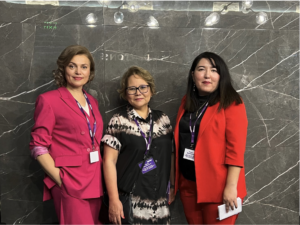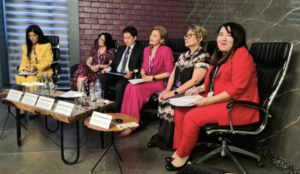On the eve of this year’s Tashkent Law Spring Forum, ICC YAAF, together with My Lawyer Law Firm and Dentons LLP, coordinated an event hosted by the Tashkent office of Dentons on Arbitration Developments in Uzbekistan and other Central Asian States. The event featured insights by practitioners and stakeholders on the Central Asian market for international dispute resolution, including keynote commentary from each of the Court members of the ICC International Court of Arbitration in the region.
Moderator Diora Ziyaeva (Partner, Dentons New York) opened the event and additional opening remarks were provided by Eldor Mannopov (Managing Partner, Dentons Tashkent), Bakhrom Rakhimov (Head of Department of Legal Protection of Interests of Uzbekistan, Ministry of Justice of the Republic of Uzbekistan), and Ulrich Kopetzki (Acting Director, Arbitration and ADR, Europe, ICC Dispute Resolution Services). They provided orientation on the Central Asian region’s investment and commercial landscape and the role of international dispute resolution in supporting development, the rule of law, and economic opportunity.

Pictured Left to Right: Prof. Natalia Alenkina, Aigoul Kenjebayeva & Firuza Bobokulova. Photo courtesy of Natalia Alenkina.
Next, the three Court members of the ICC International Court of Arbitration from the region delivered a tripartite keynote address: Natalia Alenkina of Kyrgyzstan (Associate Professor, American University of Central Asia, Bishkek; Member, ICC International Court of Arbitration), Firuza Bobokulova of Uzbekistan (Partner, My Lawyer Law Firm, Tashkent; Member, ICC International Court of Arbitration), and Aigoul Kenjebayeva of Kazakhstan (Partner, Dentons Almaty; Member, ICC International Court of Arbitration). The keynote remarks described challenges and opportunities in each of the speakers’ jurisdictions and highlighted how the rule of law continues to be advanced through international dispute resolution. The speakers also collectively introduced the audience to ICC arbitration – including, most interestingly, how they collaborate with and support each other as the main ambassadors of the ICC in the region.
Presently there is no representation in the ICC Court from Tajikistan or Turkmenistan. Further, no jurisdiction in the Central Asian region is home to an ICC National Committee. Geographically, the closest ICC National Committees are located in Armenia, Georgia, Russia, Afghanistan, and Pakistan. The ICC Court members emphasized that establishment of National Committees within the region could enhance their work, and this sentiment was echoed among the panelists in the discussion that followed.
Panel Discussion

Pictured Left to Right: Diora Ziyaeva, Kiran Nasir Gore, Prof. Dr. Islambek Rustabekov, Prof. Natalia Alenkina, Aigoul Kenjebayeva & Firuza Bobokulova. Photo courtesy of Natalia Alenkina.
A panel discussion was led by Ziyaeva and featured Professor Dr. Islambek Rustambekov (Acting Rector and Professor of Law, Tashkent State University of Law; Designated Member of Panel of Arbitrators of the ICSID from Uzbekistan), Gulirano Abdullajonova (Deputy Counsel, ICC International Court of Arbitration, joining virtually), and Kiran Nasir Gore (Independent Arbitrator and Counsel, Law Offices of Kiran N Gore, PLLC, Washington, DC).
Regional Business Opportunities and Arbitration Framework
Ziyaeva asked Gore about the industries that represent the next generation of business opportunities and foreign investment in relation to Central Asia. Gore noted that, for outsiders with interest in the region, this is the key place to start the conversation. Sectors like mining or oil and gas have traditionally led the way for foreign investment in Central Asia as the region is rich in natural resources; however, this is changing as the Central Asian states are each promulgating regulations that favor emerging industries. As example, Gore highlighted Uzbekistan’s actions to develop a favorable cryptocurrency legislative framework as well as its exploration of solar energy-friendly policies. From an international perspective, the region is increasingly interesting for new prospective foreign investors in these emerging industries.
Next, Ziyaeva asked Rustambekov to discuss the recent surge in foreign investments in Central Asia – and how the role of commercial arbitration has evolved to ensure the protection of investors’ rights. Rustambekov stated that Uzbekistan has adopted a number of improvements to its framework for international dispute resolution, including the 2018 launch of the Tashkent International Arbitration Center (TIAC). He added that development continues, as foreign investors often do not understand the options available to them. As practitioners in the region become more experienced, their greater expertise supports new investments within the region. Rustambekov noted that it is important for arbitration practitioners to gain additional knowledge as well to fully understand developing sectors like, for example, green energy. He also emphasized the importance of incorporating technological advances into dispute resolution, including for example, virtual hearings and other technologies that ease and support arbitral practice.
Why ICC Arbitration?
Ziyaeva then turned to Abdullajonova to discuss the characteristics and advantages of choosing ICC arbitration, particularly for parties from Central Asia or other emerging markets. After citing some statistics demonstrating the ICC’s global prominence, Abdullajonova explained that the ICC has enjoyed increased use in Central Asia because of the diversity of its dispute resolution tools. The ICC Rules provide that the ICC takes into account several criteria to ensure efficient and effective procedures. For example, the ICC permits emergency arbitration proceedings where there are urgent issues to be decided prior to the constitution of a tribunal. The ICC also has expedited procedures for smaller or less complex matters that may be specifically selected by the parties, or that may be recommended by the ICC once a dispute has arisen. Finally, Abdullajonova noted the scrutiny procedure for ICC awards, which is designed to maximize the legal effectiveness of an award by identifying potential issues in award enforcement before the award is issued. She also mentioned that the expertise and diverse legal cultures of the ICC Secretariat and Court members help ensure efficient management of proceedings involving Central Asian parties as well as rendering of enforceable awards.
Changes and Challenges on the Horizon
Ziyaeva next asked Gore to discuss the biggest changes in foreign investment and related dispute resolution that can be anticipated in the post-COVID environment. Gore highlighted the rise of technology in arbitrations – stating that the importance here is equal access. Technology allows parties to participate without the same level of financial burden, leading to a greater democratization of the process. However, technology also creates new ethical and other challenges, such as cybersecurity and data protection. She noted that the ICC and other arbitral institutions and stakeholders are developing best practices to guide users. Next, further to her prior remarks, Gore noted that the investors are changing as sectors grow or decline. These developments present a unique opportunity for practitioners in Central Asia to distinguish themselves – as they may have unique skills or insights to support foreign investors engaging with the region for the first time.
International Commercial Court of Uzbekistan
Ziyaeva then asked Rustambekov to provide updates from the working group within the Ministry of Justice of Uzbekistan that is seeking to establish an International Commercial Court. Rustambekov stated that the proposed court would serve as a place to resolve international disputes in Uzbek state court in accordance with international standards. The working group is evaluating the experiences of Singapore, Germany, and the Netherlands, each of which has successfully implemented similar international commercial courts. The court is expected to consist of international specialist judges – capable of resolving complex disputes in multiple languages – and it would have jurisdiction over international commercial matters, or disputes involving the application of foreign law. Lastly, the court would have jurisdiction over matters relating to the recognition and enforcement of awards. The working group continues to evaluate exactly how to structure its procedural rules and identify appropriate judges. The results and proposed roadmap are expected to be available by the end of this year.
Lessons to be Learned
Ziyaeva concluded the panel discussion by asking Abdullajonova how Central Asian parties have fared in the past ICC arbitrations and what lessons can be learned from these cases for future arbitrations. Abdullajonova first explained that dozens of parties from Central Asia have participated in ICC arbitrations. One striking point is that in most cases, parties from the region have participated as respondents. Additionally, these parties typically retain non-local counsel. There have also been more than a dozen arbitrators appointed from the region in ICC arbitrations, and an objective of the ICC over the coming years is to increase this number. In this regard, Abdullajonova emphasized the necessity to enhance the capacity building of practitioners and arbitrators from the region.
Abdullajonova concluded with practical advice for junior practitioners. She encouraged them to seek appointments as arbitrators in ICC cases, and once appointed, they should not hesitate to call upon the ICC Secretariat team for clarifications regarding the rules or any questions. Abdullajonova also recommended that practitioners publish more information about themselves so that the ICC can identify professionals from the region who can serve as arbitrators in future cases. She advised the practitioners in the region to join the ICC YAAF network, which offers opportunities to expand their professional network, exchange experiences, and gain knowledge in international arbitration from practitioners worldwide.
Audience Engagement & Concluding Remarks
To conclude the program, Ziyaeva led an engaging exchange between the speakers and audience members. Abdullajonova was asked to identify the “legal culture” with which the ICC associates itself and the strategies implemented to address differences among legal cultures. Her response highlighted that the ICC is a global institution that is able to adjust to fit the case at hand. Bobokulova added that ICC arbitrators come from broad backgrounds and draw upon their various skills when working with the institution. Indeed, the parties necessarily decide in advance many issues relating to the legal culture that guides dispute resolution, such as the seat of arbitration, the language of proceedings, and the applicable law.
Rustambekov clarified the anticipated main differences between TIAC and the expected Tashkent International Commercial Court, especially as both would be expected to function in coordination with the other. Together with Diana Bayzakova (Director, TIAC, who was present as an audience member), he shared insights from the working group in which they both participate. They highlighted that the anticipated new court would be part of the state court system. Meanwhile, TIAC arbitration is a distinct mechanism that the parties may select through an arbitration agreement. Thus, the court and TIAC arbitration would represent distinct mechanisms with different advantages that parties and practitioners can evaluate.
Overall, the program presented a mix of backgrounds and opinions regarding the growth and presence of the ICC – and international arbitration more generally – in the Central Asia region. As the region continues to develop as a political power and destination for foreign investment, supported by the rule of law and modern legal frameworks, the discussed trends should only continue.
________________________
To make sure you do not miss out on regular updates from the Kluwer Arbitration Blog, please subscribe here. To submit a proposal for a blog post, please consult our Editorial Guidelines.


